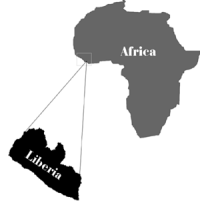- ECOWAS And MODEL Call On Lurd to Stop Fighting (allAfrica.com)
- Activists closely watch Bush in Africa

ACCRA, Ghana (FinalCall.com)–The Rev. Al Sharpton, at the head of a delegation of religious clergy from the United States, hit the ground running here, landing in the early morning July 20 with a goal of visiting war-torn Liberia to try to bring stability to a ceasefire peace between warring factions.
News that an earlier ceasefire had fallen apart and that rebels were advancing on the capital city Monrovia greeted the delegation upon their arrival. The ceasefire had been reached by opposition groups and the government of Charles Taylor during peace talks being held here.
With just about an hour’s rest after a nearly 12-hour trans-Atlantic flight, Rev. Sharpton delivered words of greeting during the international services of the Calvary Baptist Church, whose main sermon was delivered in English and French.
Declaring that he was not taking sides or offering recommendations until he had talked to all sides of the dispute, the activist preacher and candidate for the Democratic Party nomination for president of the United States, declared, “But, someone must be on the side of those children who are refugees, the dislocated women and those who have lost loved ones. We come on their side.”

Rev. Sharpton was welcomed by senior pastor Rev. Fred Deegbe, the recently elected secretary general of the Christian Council of Ghana, the first Baptist to hold that national post.
The American delegation included Min. A. Akbar Muhammad, international representative of the Nation of Islam, Rev. Al Sampson of the Chicago-based Fernwood Methodist church who was ordained by Rev. Martin Luther King Jr. and the Rev. Dr. Cornel West of Princeton University, among others.
Recalling the story of Calvary and the suffering of Jesus Christ, Rev. Sharpton told the audience that, “in the shedding of blood there can be a resurrection. We must take the sting and stink out of death … to build a new world order.
“Resurrection is a recurring theme that God can do even in our lives,” he said.
The delegation then traveled to a private meeting with some of the Liberian opposition parties, listening to the issues and asking questions. He told the opposition party members that he plans to travel to Liberia to meet with Pres. Taylor and to deliver humanitarian supplies, if a safe passage could be assured.
During a brief press statement following the meeting, Rev. Sharpton reiterated that while he had not reached a conclusion on recommendations, he agreed that the United States should do whatever it can in conjunction with African leaders to bring the peace.
“Wherever we can help the situation out, we will,” he said, “but our priority is humanitarian aid.”
The last stop on the first day of the journey was a visit to the W.E.B. DuBois Cultural Center, where the delegation viewed artifacts, a library and the final resting place of the famous Black leader from America. Rev. Sharpton also delivered a 30-minute message to about 150 enthusiastic guests.
He was welcomed by Sekou Nkrumah, who presented his American guest with a historic photo of his father Kwame Nkrumah, Ghana’s first president after independence.
In his remarks, Rev. Sharpton admonished the audience to support the museum. To come to the historic landmark and not contribute to ensure its existence “ought to be an indictment against us,” he said, noting that 2003 marks the centennial of the book, “The Souls of Black Folks.”
“We as a people must stop just dealing romantically with our history,” he said.
Rev. Sharpton also criticized his fellow Democratic Party contenders seeking the presidential nomination, saying that African issues are not on their radar screen.
“I didn’t just come here because I’m running (for president). Everybody who is running must be on the record about Africa. I don’t know the solution to Liberia, but I know there is a solution,” he said.












